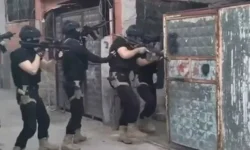Minister of Justice Yılmaz Tunç made statements on the cancellation decisions of the Constitutional Court, the suspension of DEM Party Hakkari Co-Mayor Mehmet Sıddık Akış and the extradition process of Serdar Sertçelik, the secret witness in the Ayhan Bora Kaplan investigation.
Minister of Justice Yılmaz Tunç, who came to Bolu for a series of visits, made statements on the agenda to the press members at Bolu Governorship.
‘It was tried to be misrepresented by some commentators’
Making a statement on the cancellation decisions of the Constitutional Court, Minister of Justice Yılmaz Tunç said, ‘There are some discussions and some misunderstandings in the public opinion regarding the cancellation of some articles of the decree law numbered 703 by the Constitutional Court. Decree Law No. 703 was amended to the Constitution in 2017 before the transition to the presidential government system. With the 2018 elections, the presidential government system actually started as of 2018 with the election of our President at the end of the elections. Of course, after the 2017 constitutional amendment, before the Presidential Government System actually started, the Decree Law No. 703, as the last decree law of the Council of Ministers of the parliamentary system, was enacted in the Grand National Assembly of Turkey based on the law of authorisation. Of course, there was a decision of the Constitutional Court that some issues in this decree should be regulated by law. The Constitutional Court has made some determinations that the issues that cannot be regulated by presidential decree should be regulated by law. Of course, this has been misrepresented by some commentators. The duties and powers of the president are clearly listed in Article 104 of our Constitution.”
‘There is no discussion of any authorisation’
Minister Tunç continued his speech as follows:
“The President is the head of the state, represents the unity of the state and is the head of the executive. The President of the Republic can issue Presidential Decrees on executive matters, these are the mandatory provisions of our Constitution. The President’s authority to appoint senior executives is also an authority arising from the Constitution. The matters that cannot be regulated by presidential decree are also specified in our Constitution. It is stated that no presidential decree can be issued in relation to the fundamental rights and political rights listed in sections 1, 2 and 4 of Chapter 2 of our Constitution. At the same time, if there is a provision of law, if there is a subject regulated by law, a presidential decree cannot be issued on that subject. It is also stated that the Presidential Decree cannot be issued in matters that should be regulated by law. There is no discussion of any authorisation regarding appointments here. It is a constitutional court decision stating that the situations that are regulated by law in the parliamentary system and then overlap with the decree-law should be regulated by law by the Grand National Assembly of Turkey within a period of 12 months. Therefore, the President’s authority to appoint senior executives is an authority arising from the constitution and he can also issue presidential decrees regarding the executive. Of course, there is a limitation on the issuance of presidential decrees in the Presidential Government System due to the fact that the laws in the parliamentary system are detailed on every issue. This means that an intensive work is waiting for our parliament in the coming process regarding the enactment and enactment of these harmonisation laws. I hope that we will realise a democratic, civilian constitution at the beginning of the century of our republic, hopefully at the beginning of Turkey’s century, in order to eliminate all these debates, with amendments to the constitution, if necessary, with the amendments made in our laws, and I hope that we will end the debates arising from the differences in interpretation in the laws, the interpretation differences in the constitutions, and the interpretation differences in the articles of the constitution.”
‘It is an insult to Mr President’
Minister of Justice Yılmaz Tunç also made statements regarding the suspension of DEM Party Hakkari Co-Mayor Mehmet Sıddık Akış. Minister Tunç said, ‘The Republic of Turkey is a state of law. In a state of law, there are rules, there is a constitution. Everyone is bound by this constitution and laws. Therefore, everyone is obliged to obey these rules. Our country has been fighting against terrorism for 40 years and we have paid a great price in the fight against the separatist terrorist organisation. We have given martyrs. Unfortunately, the biggest obstacle to the development and development of our country has been the terrorist organisation. It was the separatist terrorist organisation and we are a country fighting against all forms of terrorism. In this sense, we must be in unity and solidarity, as a nation, in the fight against terrorism. Especially those who are elected with the votes of the nation, those who want to make democratic politics, both in parliament and in local governments, must avoid attitudes and behaviours that will disrupt the unity and solidarity of our nation. As we have seen in Tatvan and in some municipalities, taking down the picture of our President, which represents the unity of the state, by using certain statements in the presence of cameras is an attack against our unity. Therefore, it is both an insult to Mr President. It is also an attitude and behaviour aimed at disrupting the unity of the unity of the nation. If our Public Prosecutors see an element of crime, they are already opening an investigation as an independent and impartial judiciary. Such an investigation has also been opened in Tatvan. These attitudes and behaviours should not be given the opportunity to such actions aimed at disrupting the unity of our nation and everyone should act responsibly in this regard.”
‘No one should complain about this’
Pointing out that there were some discussions on this issue in the parliament, Minister Tunç said, ‘There is Article 127 of our Constitution. In Article 127 of our Constitution, the Minister of Interior has the authority to dismiss the bodies of local administrations if there is an investigation or prosecution against the mayor, council members at the head of these bodies. This is an authorisation stemming from the constitution. Again, in Articles 45 and 46 of the Municipality Law, based on Article 127 of the Constitution, if there is an investigation or a terrorism investigation and case against them, the Minister of Interior has the authority to temporarily dismiss them with this authority arising from the Constitution. The authority to dismiss as a temporary measure and the authority to appoint a suitable administrator as an acting administrator are also regulated in detail in the Law on Municipalities. There was an investigation against the Mayor of Hakkari due to terrorism. He also has an ongoing court case. A judgement was given at the first instance. This is an authorisation arising from the Constitution and the Municipal Law. Local administrators elected with the votes of the people, our municipalities have to transfer the nation’s resources from the central government, which they receive from the government, as a service to the nation. Therefore, if they do not show this sensitivity, especially if they are subjected to terrorism investigations and prosecutions, no one should complain about this with their practices, attitudes and behaviours in the event that Article 127 of our constitution and Articles 45 and 46 of the Law on Municipalities are applied. Because the mandatory provisions of the constitution and the mandatory provisions of our laws are matters that bind us all.”
‘We hope he will be extradited to Turkey’
Regarding the extradition process of Serdar Sertçelik, who is both a defendant and a secret witness in the Ayhan Bora Kaplan investigation and who was captured in Hungary, Minister Tunç said, ‘We had initiated the extradition process regarding him. We had the necessary file translated. We had it translated into both Hungarian and English. We also met with our counterparts in Hungary. A 40-day temporary arrest warrant was issued there. The extradition trial will take place within that period. We hope that he will be extradited to Turkey as a result of that trial.”












